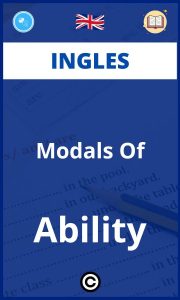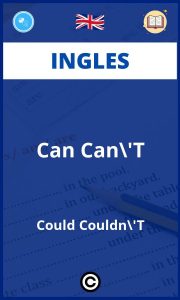
Abrir Ejercicios Ingles Auxiliar Did – PDF
Teoria : Explicacion y Ejemplos Ingles Auxiliar Did
The auxiliary verb did is used to form simple past tense questions and negations. In affirmative sentences, we use did + infinitive without “to” (did + bare infinitive). For example:
affirmative: She did sing beautifully.
negative: She didn’t sing beautifully.
question: Did she sing beautifully?
In short answers, we use did + pronoun. For example:
question: Did she sing beautifully?
short answer: Yes, she did. / No, she didn’t.
When did is used as an auxiliary verb, it goes in front of the subject. For example:
affirmative: Did she sing beautifully?
negative: She didn’t sing beautifully.
question: Did she sing beautifully?
The auxiliary verb did can also be used as a main verb. In this case, it goes after the subject. For example:
affirmative: She did a great job.
negative: She didn’t do a great job.
question: Did she do a great job?
In short answers, we use did + pronoun. For example:
question: Did she do a great job?
short answer: Yes, she did. / No, she didn’t.
The main verb do can be used as an auxiliary verb. In this case, it goes in front of the subject. For example:
affirmative: She did a great job.
negative: She didn’t do a great job.
question: Did she do a great job?
In short answers, we use did + pronoun. For example:
question: Did she do a great job?
short answer: Yes, she did. / No, she didn’t.
The main verb do can also be used as a main verb. In this case, it goes after the subject. For example:
affirmative: She does a great job.
negative: She doesn’t do a great job.
question: Does she do a great job?
In short answers, we use do + pronoun. For example:
question: Does she do a great job?
short answer: Yes, she does. / No, she doesn’t.
The auxiliary verb did is used to form simple past tense questions and negations. In affirmative sentences, we use did + infinitive without “to” (did + bare infinitive). For example:
affirmative: She did sing beautifully.
negative: She didn’t sing beautifully.
question: Did she sing beautifully?
In short answers, we use did + pronoun. For example:
question: Did she sing beautifully?
short answer: Yes, she did. / No, she didn’t.
When did is used as an auxiliary verb, it goes in front of the subject. For example:
affirmative: Did she sing beautifully?
negative: She didn’t sing beautifully.
question: Did she sing beautifully?
The auxiliary verb did can also be used as a main verb. In this case, it goes after the subject. For example:
affirmative: She did a great job.
negative: She didn’t do a great job.
question: Did she do a great job?
In short answers, we use did + pronoun. For example:
question: Did she do a great job?
short answer: Yes, she did. / No, she didn’t.
The main verb do can be used as an auxiliary verb. In this case, it goes in front of the subject. For example:
affirmative: She did a great job.
negative: She didn’t do a great job.
question: Did she do a great job?
In short answers, we use did + pronoun. For example:
question: Did she do a great job?
short answer: Yes, she did. / No, she didn’t.
The main verb do can also be used as a main verb. In this case, it goes after the subject. For example:
affirmative: She does a great job.
negative: She doesn’t do a great job.
question: Does she do a great job?
In short answers, we use do + pronoun. For example:
question: Does she do a great job?
short answer: Yes, she does. / No, she doesn’t.
Ejercicios con soluciones de Ingles Auxiliar Did
Muchos estudiantes de inglés enfrentan el problema de no tener suficiente práctica para completar ejercicios y mejorar sus habilidades. Afortunadamente, hay muchos recursos disponibles en línea para ayudar a los estudiantes a mejorar. A continuación se presentan algunos de los mejores ejercicios de inglés para completar con soluciones.
1. Ejercicios de gramática
Los ejercicios de gramática son una excelente manera de repasar y prácticar las reglas de gramática. Hay una gran cantidad de ejercicios de gramática disponibles en línea, y muchos de ellos se pueden encontrar gratis. Algunos buenos sitios para encontrar ejercicios de gramática son:
- https://www.englisch-hilfen.de/en/exercises_list/alle_grammar_1173.htm
- http://www.ego4u.com/en/cram-up/grammar
- http://www.englishpage.com/grammar/grammar.htm
2. Ejercicios de vocabulario
Los ejercicios de vocabulario son otra excelente manera de repasar y practicar el vocabulario. Hay una gran cantidad de ejercicios de vocabulario disponibles en línea, y muchos de ellos se pueden encontrar gratis. Algunos buenos sitios para encontrar ejercicios de vocabulario son:
- http://www.ef.com/english-resources/english-vocabulary/top-50-english-vocabulary/
- http://www.englisch-hilfen.de/en/exercises_list/alle_vocabulary_1174.htm
- http://www.learnenglish.de/vocabularyexercises.html
3. Ejercicios de comprensión de lectura
Los ejercicios de comprensión de lectura son una excelente manera de repasar y practicar la comprensión de lectura. Hay una gran cantidad de ejercicios de comprensión de lectura disponibles en línea, y muchos de ellos se pueden encontrar gratis. Algunos buenos sitios para encontrar ejercicios de comprensión de lectura son:
- http://www.eslreading.org/
- http://www.englishclub.com/reading/
- http://www.englishpage.com/reading/reading.htm
4. Ejercicios de listening
Los ejercicios de listening son una excelente manera de repasar y practicar la comprensión auditiva. Hay una gran cantidad de ejercicios de listening disponibles en línea, y muchos de ellos se pueden encontrar gratis. Algunos buenos sitios para encontrar ejercicios de listening son:
5. Ejercicios de speaking
Los ejercicios de speaking son una excelente manera de repasar y practicar las habilidades de hablar. Hay una gran cantidad de ejercicios de speaking disponibles en línea, y muchos de ellos se pueden encontrar gratis. Algunos buenos sitios para encontrar ejercicios de speaking son:
- http://www.englishclub.com/speaking/
- http://www.esl-lounge.com/student/speaking/
- http://www.eslcafe.com/idea/
Estos son solo algunos de los muchos ejercicios de inglés disponibles en línea. Si busca un poco, encontrará una gran cantidad de ejercicios para ayudarle a mejorar sus habilidades de inglés.
Abrir Ejercicios Ingles Auxiliar Did – PDF






